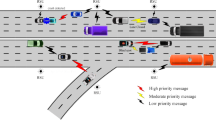Abstract
In online machine learning systems, a computer gathers sets of training data from some data sources and trains a machine learning model every it gets a set. In the cases that the time required to gather a set is long such as the case of the data gathering from connected vehicles, the delay for reflecting the observed environmental values included in the training data to the model lengthens. In this paper, we propose a system to reduce the delay for reflecting observed environmental values to the models suppressing the increase of the validation loss. Our proposed system cyclically broadcasts the parameters of the machine learning model to the data sources and the data sources calculate the result of the loss function for their observed training data. We evaluated the proposed system assuming a machine learning system for connected vehicles. The vehicles of that training data give a larger value to the result than a given threshold send the training data to the computer for training the machine learning model. Our experimental evaluation revealed that our proposed methods can achieve lower validation loss values than a conventional method.
Access this chapter
Tax calculation will be finalised at checkout
Purchases are for personal use only
Similar content being viewed by others
References
Zhou, X., Qin, D., Lu, X., Chen, L., Zhang, Y.: Online social media recommendation over streams. In: Proceedings of the IEEE International Conference on Data Engineering 938–949 (2019)
Wang, Y., Tong, Y., Long, C., Xu, P., Xu, P., Lv, W.: Adaptive dynamic bipartite graph matching: a reinforcement learning approach. In: Proceedings of the IEEE International Conference on Data Engineering 1478–1489 (2019)
Sparks, E.R., Venkataraman, S., Kaftan. T, Franklin, M.J., Recht, B.: KeystoneML: optimizing pipelines for large-scale advanced analytics. In: Proceedings of the IEEE International Conference on Data Engineering 535–546 (2017)
Considine, J., Li, F., Kollios. G., Byers, J.: Approximate aggregation techniques for sensor databases. In: Proceedings of the IEEE International Conference on Data Engineering 449–460 (2004)
Deshpande, A., Guestrin, C., Madden, S., Hellerstein, J., Hong, W.: Model-Driven data acquisition in sensor networks. In: Proceedings of the International Conference on Very Large Data Bases 588–599 (2004)
Chu, D., Deshpande, A., Hellerstein, J., Hong, W.: Aspproximate data collection in sensor networks using probabilistic models. In: Proceedings of the IEEE International Conference on Data Engineering 48–59(2006)
Nikzad, N., Yang, J., Zappi, P., Rosing, T.S., Krishnaswamy, D.: Model-Driven adaptivewireless sensing for environmental healthcare feedback systems. In: Proceedings of the IEEE International Conference on Communications 3439–3444 (2012)
Deshpande, A., Guestrin, C., Madden, S., Hong, W.: Exploiting correlated attributes in acquisitional query processing. In: Proceedings of the IEEE International Conference on Data Engineering 143–154(2005)
Gaura, E.I., Brusey, J., Allen, M., Wilkins, R., Goldsmith, D., Rednic, R.: edge mining the internet of things. IEEE Sens. J. 13(10), 3816–3825 (2013)
Jain, A., Chang, E., Wang, Y.-F.: adaptive stream resource management using kalman flters. In: Proceedings of the ACM International Conference on Management of Data 11–22 (2014)
Raafat, H.M., Tolba, A.S.: Homoscedasticity for defect detection in homogeneous flat surface products. Text. Res. J. 85(8), 850–866 (2015)
Raafat, H.M., et al.: Fog intelligence for real-time iot sensor data analytics. IEEE Access 5, 24062–24069 (2017)
Acknowledgments
This work was partially supported by JSPS KAKENHI Grant Numbers JP21H03429, JP18K11316, and by G-7 Scholarship Foundation.
Author information
Authors and Affiliations
Corresponding author
Editor information
Editors and Affiliations
Rights and permissions
Copyright information
© 2022 The Author(s), under exclusive license to Springer Nature Switzerland AG
About this paper
Cite this paper
Yoshihisa, T. (2022). An Efficient Machine Learning System for Connected Vehicles. In: Barolli, L. (eds) Advances on P2P, Parallel, Grid, Cloud and Internet Computing. 3PGCIC 2021. Lecture Notes in Networks and Systems, vol 343. Springer, Cham. https://doi.org/10.1007/978-3-030-89899-1_8
Download citation
DOI: https://doi.org/10.1007/978-3-030-89899-1_8
Published:
Publisher Name: Springer, Cham
Print ISBN: 978-3-030-89898-4
Online ISBN: 978-3-030-89899-1
eBook Packages: EngineeringEngineering (R0)




